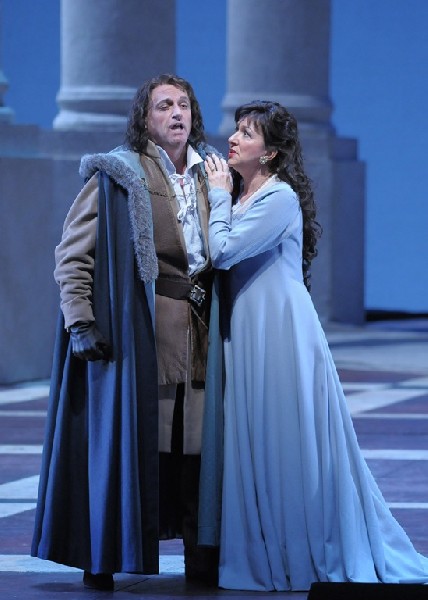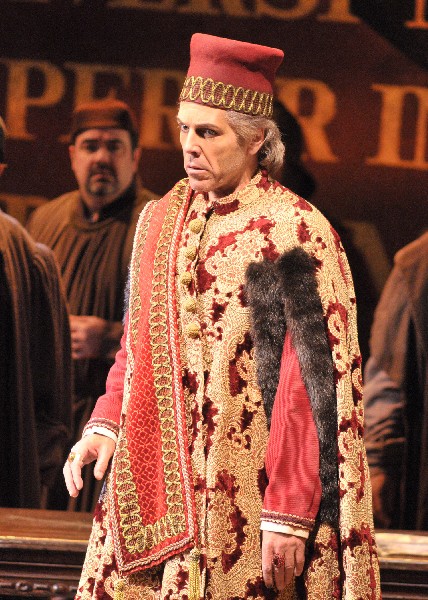Simon Boccanegra Rules at the Lyric Opera of Chicago
Lessons in Superior Opera Production
By: Susan Hall - Oct 29, 2012
Simon Boccanegra
By Giuseppe Verdi
Revised libretto by Amigo Boito
Lyric Opera of Chicago
Through November 9th.
Quinn Kelsey (Paolo Albiani), Evan Boyer (Pietro), Thomas Hampson (Simon Boccanegra), Ferruccio Furlanetto (Jacopo Fiesco), Krassimira Stoyanova (Amelia Grimaldi), Frank Lopardo (Gabriele Adorno), J'nai Bridges (Amelia's Maidservant), Bernard Holcomb (Captain of the Crossbowmen).
Sir Andrew Davis(Conductor), Elijah Moshinsky (Director), Michael Yeargan (Set Designer), Peter J. Hall (Costume Designer), Duane Schuler (Lighting Designer), Martin Wright (Chorus Master).
The casting of six major talents, whose voices mix and match to soothe, excite and satisfy the ear in arresting blends, is only one of the many pleasures of this production of Simon Boccanegra at the Lyric Opera in Chicago.
Under the direction of Elijah Moshinsky, the singing actors are in character, notably in roles which move through arcs, from dark to light, or light to dark. Tall columns designed by Michael Yeargen for this joint production with Covent Garden form archways through which the action proceeds. The starkness works wonderfully to keep the rich vocal score on display, front and center.
The action takes place at the end of the Middle Ages. Reason has not yet challenged primitive violence. Oddly it is the soul of a pirate that comes closest to the Renaissance mindset which lies ahead.
That Boccanegra learned from his experiences on the high seas is touchingly apparent, as is his basically conciliatory worldview in which dire situations can be resolved win-win. Of course he makes a big mistake in judgment at the end, when he is thirsty. Moshinsky says that big ideas flourish when a family of colleagues brings them together. "The best stage direction is direction you can't see." Certainly you feel it in his Boccanegra.
A slightly raked floor of large marble squares alternating black and white serves as the setting for a dark ascension of the Pirate Boccanegra to Doge of Genoa, the back story told in the Prologue. Quinn Kelsey, understandably a rising star baritone, is doge-maker. From his first hushed aria to his curse in the council chamber and march to the gallows he is magnificent.
Krassimira Stoyanova makes her Lyric Opera debut in the role of Amelia. She is a dashing singing actress, her expressive mid range lush and lovely. As she warmed up, her top became a strand of melodic song, sometimes punctuated with arresting trills and warbles. She has pinpoint accuracy of pitch and takes ungainly note spans and varied dynamics with a cool skill. Her beautiful and varied soprano is more than matched by her fluid motions.
As confusing as Amelia's genealogy may be, the emotional alliances and breakups are clear in Verdi's duets, trios and quartets. Verdi responded to Boito’s clarification of the drama when he was called in almost 30 years after the original production had problems.
Ferruccio Furlanetto is familiar in his wonderful bass growl, which has purity to which the upper register adds a rich and moving vibrato. The low G flat in "Il lacerto spirtu" thrilled. The transition from one texture to another is seamless as he channels Verdi. He captures the arc of his character, from the vicious beginnings as villain to his redemptive moments comforting Boccanegra at the end.
Frank Lopardo is a Lyric stalwart. In the role of Adorno, his soaring tenor has just the right edge to pierce the orchestra and capture the ear. Adorno in Lopardo's performance is no longer the weaker of Amelia's two suitors. His voice mixed in an exciting and rich style with Stoyanova's and they made a convincing romantic pair. Lopardo takes us from cocky suitor to tender son-in-law of his arch enemy with thoughtful, beautifully sung ease.
Thomas Hampson sounds as welcome in Chicago as he is in his Opernhaus Zurich home. An arresting buccaneer Boccanegra, he is trapped by love interests and power grabs. Yet it is easy to imagine him as a pirate past, subdued by the loss of his love, Maria and also enticed by power because he is of the people and grasps their needs.
Standing tall as he echoes Mark Anthony in his own version of Friends, Romans, Countrymen,” and in swooping robes that often appear to hide treasure (swords?), he is at once convincing and touching.
Hampson talks about the characters "deep abiding sense of humanity and compassion...",which he fully realizes. His burnished tenor and consummate musicianship remind us how spoiled we are by his presence in the opera and concert world. To Boccanegra he brings nobility to the vocally demanding role. A tale of two fathers is wrenchingly outlined in the duet between Hampson and Furlanetto.
This is an opera in which the singing stars. The orchestra is conducted by Davis to provide background with occasional bursting statements. Yet each character clearly marks his place and holds you in thrall to the story's unfolding from start to finish.



